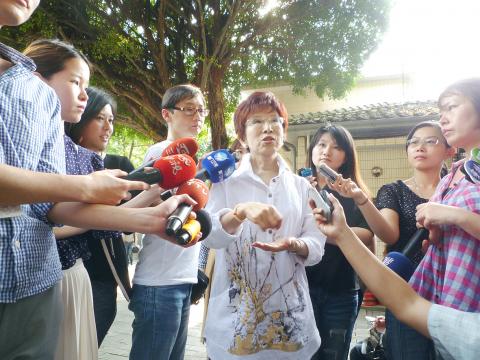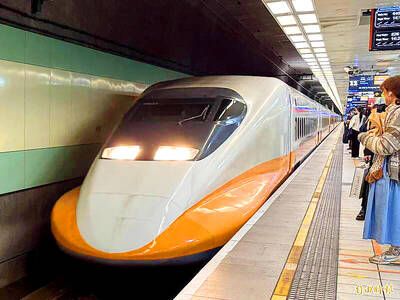Deputy Legislative Speaker Hung Hsiu-chu (洪秀柱) yesterday declared her intention to join the Chinese Nationalist Party’s (KMT) presidential primary to provide a spark to the party’s lackluster presidential campaign.
Hung, who has spoken out in recent weeks about the reluctance of senior party members to announce their bids, said she would register as a nominee after the party’s new primary election system is set up.
The deputy speaker said she was “determined” and there would be “no turning back” on her decision to join the race.

Photo: Tseng Wei-chen, Taipei Times
Competing against her comrades in the primary is the only way for the KMT to establish an “intraparty model for democracy,” Hung said.
The deputy speaker said she would not accept any kind of mediation asking her to withdraw, because any presidential candidate who is a product of mediations and negotiations — which has happened in the past — would put the KMT in a negative light.
Hung called for an open and fair primary in which party members would have the chance to participate and express their point of view on national governance and development.
It would also be the KMT’s first step to show the public that it has indeed changed, she said.
“It used to be that a candidate is decided behind closed doors; whoever showed promise was selected. However, I think that method is outdated. It would not bode well for the KMT if we were to follow this traditional way when we are already short of time,” she said.
Hung has over the past several weeks voiced her concern about the party not being able to field a candidate for the presidency, especially as none of the senior party members considered to be potential contenders — including New Taipei City Mayor and KMT Chairman Eric Chu (朱立倫) and Legislative Speaker Wang Jin-pyng (王金平) — has signaled their intention to run in the election next year.
Hung urged the party to start the nomination process soon, saying that the KMT will otherwise not be well-prepared seeing that there is little consensus on a potential candidate.
KMT Secretary-General Lee Shu-chuan (李四川) said on Saturday last week that the party would start the presidential nomination process early this month, which is not late compared with 2008 and 2012, when it was also launched in April.

The inspection equipment and data transmission system for new robotic dogs that Taipei is planning to use for sidewalk patrols were developed by a Taiwanese company, the city’s New Construction Office said today, dismissing concerns that the China-made robots could pose a security risk. The city is bringing in smart robotic dogs to help with sidewalk inspections, Taipei Deputy Mayor Lee Ssu-chuan (李四川) said on Facebook. Equipped with a panoramic surveillance system, the robots would be able to automatically flag problems and easily navigate narrow sidewalks, making inspections faster and more accurate, Lee said. By collecting more accurate data, they would help Taipei

TAKING STOCK: The USMC is rebuilding a once-abandoned airfield in Palau to support large-scale ground operations as China’s missile range grows, Naval News reported The US Marine Corps (USMC) is considering new sites for stockpiling equipment in the West Pacific to harden military supply chains and enhance mobility across the Indo-Pacific region, US-based Naval News reported on Saturday. The proposed sites in Palau — one of Taiwan’s diplomatic allies — and Australia would enable a “rapid standup of stored equipment within a year” of the program’s approval, the report said, citing documents published by the USMC last month. In Palau, the service is rebuilding a formerly abandoned World War II-era airfield and establishing ancillary structures to support large-scale ground operations “as China’s missile range and magazine

A 72-year-old man in Kaohsiung was sentenced to 40 days in jail after he was found having sex with a 67-year-old woman under a slide in a public park on Sunday afternoon. At 3pm on Sunday, a mother surnamed Liang (梁) was with her child at a neighborhood park when they found the man, surnamed Tsai (蔡), and woman, surnamed Huang (黃), underneath the slide. Liang took her child away from the scene, took photographs of the two and called the police, who arrived and arrested the couple. During questioning, Tsai told police that he had met Huang that day and offered to

BETTER SERVICE QUALITY: From Nov. 10, tickets with reserved seats would only be valid for the date, train and route specified on the ticket, THSRC said Starting on Nov. 10, high-speed rail passengers with reserved seats would be required to exchange their tickets to board an earlier train. Passengers with reserved seats on a specific train are currently allowed to board earlier trains on the same day and sit in non-reserved cars, but as this is happening increasingly often, and affecting quality of travel and ticket sales, Taiwan High-Speed Rail Corp (THSRC) announced that it would be canceling the policy on Nov. 10. It is one of several new measures launched by THSRC chairman Shih Che (史哲) to improve the quality of service, it said. The company also said